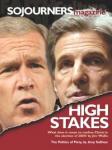While the Iraq war and the American election have been dominating the news, events this year in a third country, Iran, may point to a new crisis next year.
In February, the BBC reported that alienation from Iran’s regime of hard-line mullahs was deepening. Women were shedding black chadors, and forbidden satellite TV channels were avidly watched. "The mosques are empty," an Iranian sociologist told The New York Times. The previous month, Iran’s Guardian Council arbitrarily disqualified 3,600 candidates from parliamentary elections, including most incumbent reformers. When elections were held, most Iranians didn’t bother to vote.
Once installed, the new parliament rejected the U.N. convention banning discrimination against women, and arrests of women for wearing "un-Islamic" dress surged again. In September, Reporters Without Borders denounced the regime for jailing three journalists and the father of another one, calling the latter "a despicable act."
With the safety valve of reformism shut off, the regime’s brutality is stoking the steam of opposition - even among clerics. Ayatollah Montazeri complained of "court summonses, newspaper closings, and prosecutions of dissidents," and another moderate Shia leader called the regime "society’s dregs and fascists...who are convinced that yogurt is black."
The regime has also provoked alarm abroad. In July, BBC sources familiar with the work of the International Atomic Energy Agency said that "Iran wants to produce nuclear weapons," and on Sept. 12 Iran’s supreme leader, Ayatollah Khamenei, called the United States a "clear manifestation of evil."
WHOEVER IS THE American president next year, he is unlikely to stand by as this regime builds nuclear arms. But his options are far from clear. Aryo Pirouznia, an Iranian student leader, says that military intervention "would be the biggest mistake the United States could make," destroying pro-American feeling among Iranians. Yet it is the action of Iranians that could be decisive.
Huge protests in 1999 and 2003 showed that popular force against the regime can be summoned, but that demonstrations alone are not enough. A broader-based opposition is needed, comparable to the "people power" movement that removed a Filipino dictator or the student-sparked campaign in Serbia that ousted Slobodan Milosevic, "the Butcher of the Balkans."
Especially crucial is the knowledge of how to direct such a movement on a sustained basis, with a strategy aimed at fracturing the regime’s internal support. It would have to be fired by a clear, unifying goal, such as new elections coupled with ending the Guardian Council’s veto over parliament - the political equivalent of regime change. And to enlist the participation of ordinary Iranians, it would have to be strictly nonviolent.
Beginning with low-risk tactics of noncooperation, such as strikes in state-owned industries and boycotts of state agencies or stores, a movement could direct a sequence of disruptive nonviolent actions so numerous and dispersed around the country that the police and military could not suppress them all.
Even if greater repression were ordered, the readiness of soldiers to shoot civilians on behalf of rulers who have lost the people’s consent is in inverse proportion to the majority’s determination not to be cowed. Just as the anti-apartheid movement made South Africa "ungovernable," civilian power in Iran could do likewise.
The key variable is the quality of the strategy used to wage nonviolent conflict with the regime. As they did in helping Serbs who campaigned against Milosevic, the governments of the United States and other democratic nations could give support to a civilian-based movement in Iran. Needed most is training in nonviolent strategies, as well as better "movement technology" useful in organizing and communicating with the people.
All governments and institutions that are concerned about the intentions of Iran’s leaders should aid Iranians who are ready to take up nonviolent resistance to win their freedom - because they want change in Tehran more than anyone else.
Peter Ackerman was executive producer of the PBS documentary Bringing Down a Dictator and Jack DuVall was president of the International Center on Nonviolent Conflict in Washington, D.C., when this article appeared.

Got something to say about what you're reading? We value your feedback!